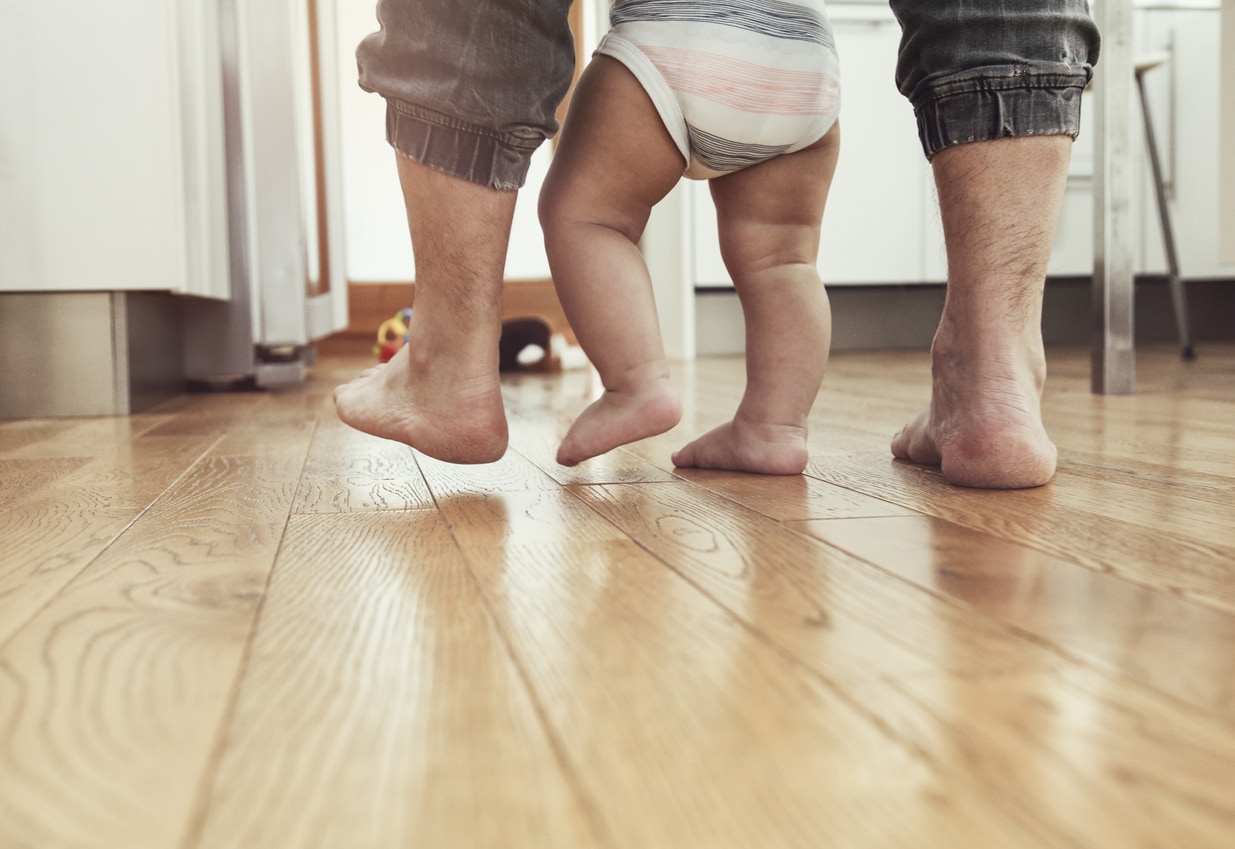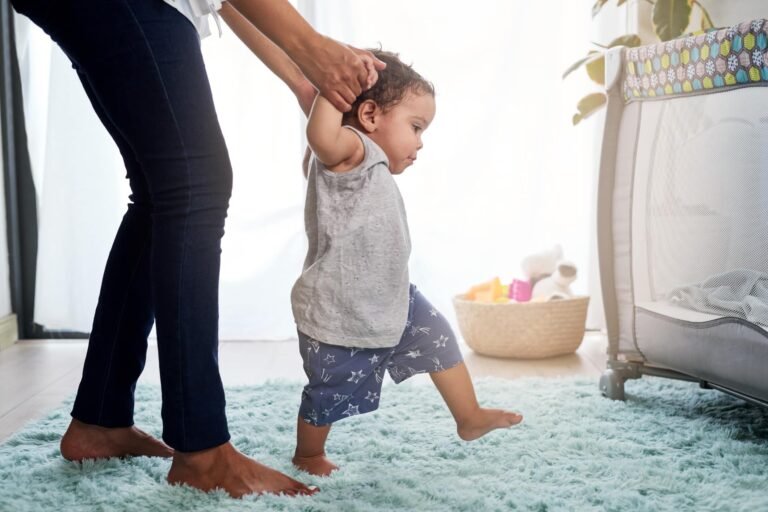If you’re wondering when babies start walking, taking their first steps involves the coordination of many factors. An infant’s developing muscles, sense of balance, and ability to build on the skills used to sit and stand all contribute to reaching the walking milestone.1 Here, you will learn about when this can happen, the signs that your child will walk soon, how you can support your baby’s first steps and the reasons why babies are late to walk.
You may be wondering about the age at which babies start taking their first steps. Children start walking at different ages, so while 12 months is the average age, your baby may take their first steps months earlier or later. Most babies learn to walk anywhere from 9 to 17 months. Once they learn to walk, it may take them a while to maintain their balance consistently.4
To learn how to walk, your baby will rely on skills he has already mastered. These include rolling over, sitting up, crawling, etc.2 Some babies prefer to crawl or slide rather than crawl.3 Once they learn how to pull themselves up to a standing position, they may hold on to furniture or your legs.8
After your baby has mastered this skill, he can begin to travel along the furniture. As their balance improves, they can practice standing without holding on to anything.5 Then, as your baby’s confidence grows, he can take his first wobbly steps. You may notice at first that their legs are wide apart.2 This stance is temporary while they work to improve their balance.4 Their initial attempt at walking probably won’t get them very far, but many toddlers progress from taking their first steps to actually walking within days.5
These milestones are signs that your baby will start walking independently soon:4.8
- Your baby can pull himself up to a full stand.
- They hold on to furniture while taking steps.
- They can stand without holding on to anything.
Once your baby can stand independently, you can help them learn to take their first steps by holding their hands and walking with them.4 Being physically close to your child as they explore this new skill can help them feel safe as their confidence gradually builds. They can also practice independently by pushing an overturned laundry basket or stable and supportive push toys around the house.4 To encourage your baby’s first steps, you can try standing a short distance away and encouraging him to move towards you by showing him a fun toy.5
Creating a safe environment for your baby as they learn to walk is key to avoiding accidents. But unfortunately, falls are inevitable.8 When your child falls, offer a quick, comforting hug and encourage them to try again. They will look at your reaction to their accident. If you remain calm, you can provide your child with strong reassurance.2

While your baby is learning how to walk indoors, shoes are not necessary. Bare feet or socks with grips can help the normal growth of feet and toes. Once your baby starts walking outside, he should wear shoes to protect his feet.9
While your baby is learning to walk, it can be tempting to compare them to others their age who are already walking. Remember, each child reaches developmental milestones in their own time. However, if you are concerned that your child may have a developmental delay, talk to their doctor. They could benefit from a developmental assessment, especially if they are 18 months old and not walking independently, seem to have trouble walking steadily on one side, or are struggling more than usual with this milestone.5
Some reasons for delayed walking in babies include:2.7
- Genetics: Some rare genetic syndromes can affect your baby’s ability to walk. Or, if you or their other parent were latecomers, it could be an inherited trait.
- Caring and inclusive personality: Another reason babies may be slow to reach the walking milestone is that some children are not interested in the risk involved in walking. They may just prefer to spend their time learning that new skill.
- Adjusted Age: If your baby was born prematurely, your pediatrician will use their adjusted age to track their milestone achievement. This means you use their due date, not their actual birthday, to track their progress. When you compare your baby to children of the same chronological age, they may seem behind. But remember, it’s on a different timeline.
- Hypotonia: Sometimes babies have low muscle tone, known as hypotonia. Since large leg muscles are required for walking, these children need more time and support to learn to walk.
Once your baby can walk independently, he will practice stopping, changing directions, squatting and standing.3 Running is next, although this may not happen until 15 to 18 months for some children.4 Your baby will continue to build on his new skills and soon will be able to do things like get on and off a chair or sofa, kick a ball and climb a few stairs without help.6
Your baby’s first steps take effort and acquiring this new skill takes time. It can be difficult to watch your baby struggle as he undertakes this effort. However, your comfort and encouragement will give them the support they need. When your baby is ready, he will build on the milestones he has already achieved and bravely begin to take his first steps!
